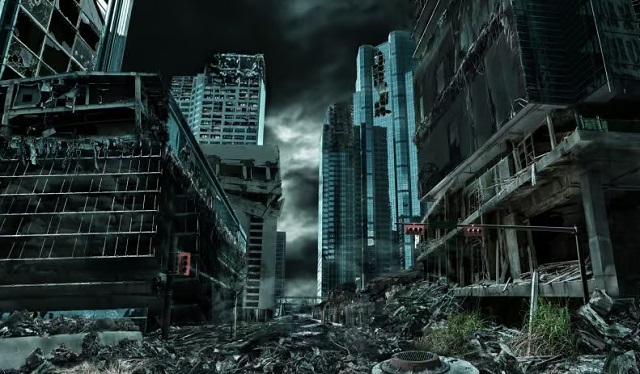Business
What Will Become of Cities?

From the Brownstone Institute
BY
Everyone was supposed to be back at the office by now. It’s not really happening, however, and this has huge implications for the future of the American city.
Part of the reason is the cost, not only the finances of commuting but also the time. Another contributing factor is the crime and homeless population, which can be quite scary. Between inflation, rising poverty, substance abuse, and rampant post-lockdown incivility, the cities have become far less attractive. The impact on the commercial sector is becoming ever more clear.
Leases are coming up for large office spaces in major cities around the US. But there is a serious problem on the way. Occupancy of these offices is dramatically down in most places around the country. The decline is 30 percent on average and much more in San Francisco, Chicago, and New York City. That’s for now but many tech companies and others have laid off workers, meaning that even the companies that renew will be looking to downsize dramatically and with shorter-term leases.
Dylan Burzinski of Green Street writes in the Wall Street Journal:
“What began as a two-week work-from-home experiment in March 2020 evolved into an entrenched hybrid/remote work environment. Despite return-to-office mandates, office-utilization rates (how many people are physically in an office on any given day) have failed to pick up meaningfully this year and are still 30% to 40% below 2019 levels for most office markets across the country. Employers have shed office space as a result, helping send the amount of office space available for lease shooting up to historic highs across most major U.S. cities. The so-called availability rates are hovering at 25% on average compared with slightly above 15% before Covid—and things could get worse before they get better.”
You might say: there is nothing wrong with remote work. This would have happened regardless. Cities as we know them will pass into the night eventually as the whole world becomes digital.
That might be true in the long term, but it would have been far better to happen organically and not by force. That was the essence of what Burzinski calls the “pandemic” but of course it wasn’t a pathogen that sent millions out of the cities and leaving for the suburbs. It was the forced closures and then vaccine mandates and compulsory segregation by vaccine status.
For a time, cities like New York City, Boston, Chicago, and New Orleans were using state power to exclude shot refuseniks any normal public accommodations. The unvaccinated could not go to the library, the theater, restaurants and bars, and museums. It’s hard to believe that this actually happened in the land of the free but that is the real history of just two years ago.
Then once workers got a taste of remote work, and they fully realized just how ridiculously annoying the commute and office culture truly is, they would not and could not be pushed back into a full-time relationship with the office. That has left half and fully empty skyscrapers in multiple cities in the US.
The signs of doom are everywhere. A poll of New Yorkers has 60% saying that life quality is falling and this is in part due to far less quality foot traffic. San Francisco has record office vacancies. Even large cities in Texas have 25% vacancies. Population declines in many cities are continuing long after pandemic restrictions have been lifted.
And here is Boston.com:
Absent flexibility from building owners, businesses worry that downtown will see even more vacancies and that tourists and office workers slowly returning to the neighborhood will have less reason to make the trip. Consider the worst-case scenario: Downtown falls further into post-pandemic disarray or a long-feared “doom loop.”
Like many big-city downtowns, Boston is still in the midst of its recovery after COVID. Many offices and ground-floor spaces remain empty, and buildings lately have sold for sizable losses. Fears about what downtown will become were only exacerbated by the bankruptcy of the coworking giant WeWork, one of the largest office tenants in Boston.
How far this will go and what the implications will be is anyone’s guess. Will the skylines change? Are we looking at demolitions of some of the grandest structures in the coming years? It’s not entirely out of the question. Economic reality can be like a brick wall: when the expense consistently outpaces the revenue, something has to change.
Why not convert office spaces to domestic apartments? It’s not so easy. The buildings put up after the Second World War were made for air conditioning and had wide footprints without windows in a large swath of the space. That simply doesn’t work for apartments. Cutting a giant hole down the middle is technically possible but economically expensive, requiring the rents in the resulting properties to be in the luxury range.
The next phase will be the fiscal crisis. Dying business districts, declining population, empty office buildings all mean falling tax revenue. The budgets won’t be cut because of pension obligations and school funding. The next place to look is to the capital for bailouts and then of course the federal government. But those will only buy time and certainly won’t address the underlying problem.
What bugs me most about this is just how much it fits with the dream of Anthony Fauci as he and his co-author explained back in August of 2020. Writing months after lockdowns, with American cities on fire with protests, he wrote that we need “radical changes that may take decades to achieve: rebuilding the infrastructures of human existence, from cities to homes to workplaces, to water and sewer systems, to recreational and gatherings venues.”
If your view is that the real problem with infectious disease traces to “the neolithic revolution, 12,000 years ago,” as they claim, you are going to have a serious problem with cities. Recall that this is the guy who said we need to stop shaking hands, forever. The notion of a million people working and socializing together in a few square miles of space is something that would run contrary to the entire vision.
Klaus Schwab of the WEF, too, has an issue with large cities, too, of course, with constant complaints about urbanization and the imagined world in which large swaths of our lives are spent online rather than with friends.
So a tremendous downscaling of cities might have been part of the plan all along. You will notice that none of the cities on the chopping block seem to be offering a viable plan for saving themselves. They could dramatically cut taxes, deregulate childcare, open up more schooling options, turn police attention to petty crime and carjacking instead of traffic fines, and open up zoning. That’s not happening.
New York is going the opposite direction, having effectively banned AirBnB in the city. Why did the city council do this? Because too many renters with space found it more lucrative to offer short-term rentals and overnight stays rather than make long-term contracts for residents. This is a sneaky way of pillaging property owners, not exactly a good plan for attracting real estate investment.
All of this speaks to a much bigger problem, which is that the whole political system seems to be engaged in an amazing game of “Let’s pretend” despite the overwhelming evidence of the disaster that has befallen us. No serious efforts are underway to reverse the damage of pandemic lockdowns and vaccine mandates and segregation. This is partly because there has been zero accountability or even honest public debate about what governments around the country did from 2020-2022. We live amidst the carnage but justice seems farther off than ever.
Yes, a complete reversal is possible but it seems ever less likely, especially with the continued efforts to purge from public life those who dissented during the crisis, as well as the intensifying censorship on all mainstream media platforms.
Once you step back from it, nothing really makes sense. One might suppose that when a whole society – and really globe – embarked on such a crazy experiment and utterly failed in every way, that there would be a major effort to come to terms with it.
The opposite is happening. Even with America’s treasured cities in such grave danger, so much of it provoked by terrible policies over four years, we are still supposed to either not notice or chalk it all up to some inexorable forces of history of which no one has any control.
Automotive
Canadian interest in electric vehicles falls for second year in a row: survey

From LifeSiteNews
Canadians’ disinterest in electric vehicles comes as the Trudeau government recently mandated that all new light-duty vehicles in Canada are zero emission by 2035.
Research has revealed that Canadians are increasingly unwilling to purchase an electric vehicle (EV).
According to an April 22 survey from AutoTrader, Canadians remain skeptical of Prime Minister Justin Trudeau’s electric vehicle mandate and ongoing advertisement surrounding electric vehicles, as interest in owning one dropped for a second year in a row.
“Overall, while almost half of non-EV owners are open to buying an EV for their next vehicle, interest in EVs has declined for the second year in a row,” reported Tiffany Ding, director of insights and intelligence at AutoTrader.
In 2022, at least 68 percent of Canadians were interested in buying an electric vehicle. However, by 2023, the number declined to 56 percent. So far in 2024, there is even less interest, with only 46 percent saying they were open to purchasing one.
“AutoTrader data shows a direct correlation to gas prices and EV interest, and since gas prices have normalized from their peak in 2022, EV interest has also dropped,” a summary of the survey explained.
However, Canadians did show a slight increase of interest in hybrid vehicles, with 62 percent of those looking to purchase an electric vehicle saying they would look at a gas-electric hybrid, compared with 60 percent in 2023.
The survey also questioned Canadians regarding Trudeau’s Zero Emission Vehicle (ZEV) mandate, which requires all new light-duty vehicles in Canada are zero-emission by 2035, essentially banning the sale of new gasoline/diesel-only powered cars.
The mandate comes despite warnings that it would cause massive chaos by threatening to collapse the nation’s power grids.
“Over 75 percent of respondents are aware of the federal government’s ZEV mandate, which requires all new light-duty vehicles sold in Canada to be zero-emission by 2035,” the survey found.
However, the respondents revealed that they believe it’s “unlikely that Canada will be able to meet the federal government’s ZEV target due to the current inadequate charging infrastructure or a change in political power that could revoke or amend the ZEV mandate timeline.”
Canadians’ concerns in buying an electric vehicle include limited travel range/distance, inadequate availability of charging stations, higher purchasing costs, and concerns that they do not perform well in cold weather.
Indeed, this winter, western Canadians experienced firsthand the unreliability of Trudeau’s “renewable” energy scheme as Alberta’s power grid nearly collapsed due to a failure of wind and solar power.
Trudeau’s plan has been roundly condemned by Canadians, including Alberta Premier Danielle Smith. In 2022, Smith denounced a federal mandate that will require all new cars sold after 2035 to be “zero emission” electric (EVs) vehicles and promised that Albertans will always have the choice to buy gasoline-powered cars.
Since taking office in 2015, Trudeau has continued to push a radical environmental agenda similar to the agendas being pushed the World Economic Forum’s “Great Reset” and the United Nations’ “Sustainable Development Goals.”
The reduction and eventual elimination of the use of so-called “fossil fuels” and a transition to unreliable “green” energy has also been pushed by the World Economic Forum (WEF) – the globalist group behind the socialist “Great Reset” agenda – an organization in which Trudeau and some of his cabinet are involved.
The Trudeau government’s electric vehicle plan comes despite the fact Canada has the third largest oil reserves in the world. Electric cars cost thousands more to make and buy, are largely considered unsuitable for Canada’s climate as they offer poor range and long charging times during cold winters and have batteries that take tremendous resources to make and are difficult to recycle.
Business
Ottawa’s capital gains tax hike—final nail in ‘business investment’ coffin

From the Fraser Institute
By Tegan Hill and Jake Fuss
From 2014 to 2022, inflation-adjusted total business investment (in plants, machinery, equipment and new technologies but excluding residential construction) in Canada declined by C$34 billion. During the same period, after adjusting for inflation, business investment declined by a total of $3,748 per worker
According to the recent federal budget, the Trudeau government plans to increase the inclusion rate from 50 per cent to 66.7 per cent on capital gains over $250,000 for individuals and on all capital gains realized by corporations and trusts. Unfortunately, this tax hike will be the final nail in the coffin for business investment in Canada, which likely means even harder economic times ahead.
Canada already faces a business investment crisis. From 2014 to 2022, inflation-adjusted total business investment (in plants, machinery, equipment and new technologies but excluding residential construction) in Canada declined by C$34 billion. During the same period, after adjusting for inflation, business investment declined by a total of $3,748 per worker—from $20,264 per worker in 2014 to $16,515 per worker in 2022.
While business investment has declined in Canada since 2014, in other countries, including the United States, it’s continued to grow. This isn’t a post-COVID problem—this is a Canada problem.
And Canadians should be worried. Businesses investment is key for strong economic growth and higher living standards because when businesses invest in physical and intellectual capital they equip workers with the tools and technology (e.g. machinery, computer programs, artificial intelligence) to produce more and provide higher quality goods and services, which fuels innovation and higher productivity. And as firms become more efficient and increase profits, they’re able to pay higher wages, which is why business investment remains a key factor for higher incomes and living standards.
The Trudeau government’s policies—increased regulation, particularly in the energy and mining sectors (which makes Canada a relatively unattractive place to do business), higher and uncompetitive taxes, and massive federal deficits (which imply future tax increases)—have damaged business investment.
Unsurprisingly, weak business investment has correlated with a weak economy. In the fourth quarter of 2023, real economic growth per person ($58,111) officially fell below 2014 levels ($58,162). In other words, Canadian living standards have completely stagnated. In fact, over the last decade economic growth per person has been the weakest on record since the 1930s.
Instead of helping fix the problem, the Trudeau government’s capital gains tax hike will further damage Canada’s economy by reducing the return on investment and encouraging an exodus of capital from the country. Indeed, capital gains taxes are among the most economically-damaging forms of taxation because they reduce the incentive to invest.
Once again, the Trudeau government has enacted a policy that will deter business investment, which Canada desperately needs for strong economic growth. The key takeaway for Canadians? Barring a change in policy, you can expect harder times ahead.
Authors:
-

 Automotive2 days ago
Automotive2 days agoThe EV ‘Bloodbath’ Arrives Early
-

 CBDC Central Bank Digital Currency1 day ago
CBDC Central Bank Digital Currency1 day agoA Fed-Controlled Digital Dollar Could Mean The End Of Freedom
-

 Frontier Centre for Public Policy1 day ago
Frontier Centre for Public Policy1 day agoHow much do today’s immigrants help Canada?
-

 Alberta10 hours ago
Alberta10 hours agoPrincipal at Calgary Elementary School charged with possession of child pornography
-

 Fraser Institute11 hours ago
Fraser Institute11 hours agoFederal government’s fiscal record—one for the history books
-

 Alberta10 hours ago
Alberta10 hours agoRed Deer Company fined $360,000.00 after 2022 workplace fatality
-

 Brownstone Institute1 day ago
Brownstone Institute1 day agoThe Numbers Favour Our Side
-

 Alberta5 hours ago
Alberta5 hours agoAlberta threatens to fight Trudeau government restrictions on Canada’s plastics industry









